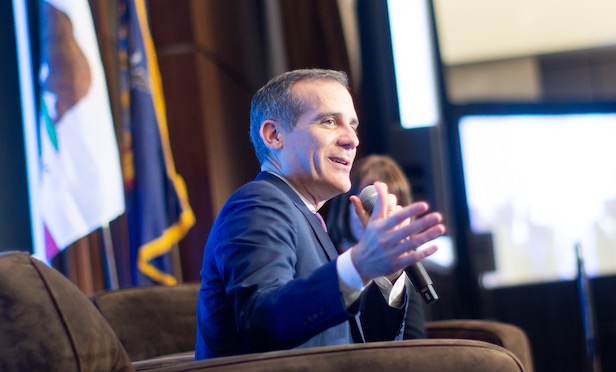 Eric Garcetti, Mayor of Los Angeles, speaks at RPA's Annual Assembly/ Photo credit: Regional Plan Association
Eric Garcetti, Mayor of Los Angeles, speaks at RPA's Annual Assembly/ Photo credit: Regional Plan Association
NEW YORK CITY—Los Angeles Mayor Eric Garcetti said LA and New York City share similar stories of upward economic growth, investments and credit ratings. But along with their progress the cities face challenges with transportation, affordable housing, homelessness and a gap in opportunities—leaving some people behind.
Garcetti lived in New York, attending Columbia University for college, then receiving a master's degree at the School of International and Public Affairs in 1993. So, the mayor has seen the changes in New York as well as in Los Angeles, where he started on the city council in 2001.
He coined today an age of “anxiete-ment,” the mix of anxiety and excitement. “It has never been a better time to live in cities but it has never been a more stressful time to live in cities,” he said.
Garcetti explained there are amazing technological breakthroughs every day. But we are also stressed by how fast they are coming. With technology he can FaceTime his daughter across the country. But he also wonders if technology will leave her without a job someday. There are more medical advances every day. But there's greater economic anxiety where “too many Americans cannot afford even one medical emergency,” he said.
As one of the featured speakers at the Regional Plan Association's 27th Annual Assembly, Garcetti told the crowded ballroom at the Grand Hyatt in Midtown, “What seems radical today, will be conventional tomorrow.”
Both New York and Los Angeles have passed $15 minimum wage laws. In LA they achieved this while also reducing taxes on businesses. New York recently passed congestion pricing. LA passed Measure M, a permanent sales tax to fund public transit.
Los Angeles, once notorious for its congested traffic, lagged in public transportation. But spending billions of dollars, it radically caught up, even surpassing other cities. It has now built more infrastructure than any city in the US, according to its mayor.
Winning the bid for the 2028 Olympics has motivated LA to move even faster. LAX Airport is undergoing a $14 billion upgrade. Ground had been broken with constructing the monorail at the airport, and building the transit line from the Crenshaw neighborhood to LAX. The city already has extended the Expo Line from downtown to Santa Monica.
Similar to New York's OneNYC plan to reduce carbon emissions by 80% by 2050, LA is on track to reduce by 45% its greenhouse gas emissions by 2025. The city has committed to net zero carbon emissions by 2050. As a result LA has installed more solar power than any other city in the country, says Garcetti.
“The economy and the environment are part of our sustainability plan. We created 35,000 new green jobs while consciously focusing on this industry. We understand the economy and the environment are interdependent,” he said. “In 2016, we had the largest drop in carbon emissions of any city in the world—11%. In that same year, our unemployment rate dropped 14%.”
Garcetti explained how to him three ideas define Los Angeles, New York and the US: freedom, innovation and belonging. Freedom involves economic freedom, not being priced out of your home, and having a job to put food on the table. Innovation enables civilizations to continue to move forward. “Belonging” goes beyond “diversity and inclusion” in putting everyone on equal footing. Garcetti then described himself as an “Average American, half Jewish, half Mexican, with an Italian last name.”
“We all belong in New York. We all belong in LA. We all belong in this nation,” he said.
He referenced how 2000 years ago Aristotle wrote that the city came into being to preserve life. But it exists for the good life, which goes beyond feeling secure. “It is about falling in love and finding someone to spend the rest of our lives with. It's about learning and understanding something that changes our thinking and what we decide to do professionally. It's the opportunity to hire people, change their lives, and to build something great.”
To build a city for the good life, Garcetti's advice to political and civic leaders was, “Don't be afraid of being bold, of failing forward and embracing capabilities.”
He quoted the poet and playwright Robert Browning who wrote your reach should exceed your grasp, “Or what is heaven for?” In developing real estate, in grappling with the intractable problems in a city, in fighting climate change, in pursuing a society of justice—it's reaching for the good life. Garcetti said think about American history, of people who fought slavery but died in chains, of women who wanted to vote but never could, of GIs who went to war but never came home. They reached beyond what they would ever hold, with hopes for their children or future generations. He then concluded, “Or what is America for?”
© Touchpoint Markets, All Rights Reserved. Request academic re-use from www.copyright.com. All other uses, submit a request to [email protected]. For more inforrmation visit Asset & Logo Licensing.







